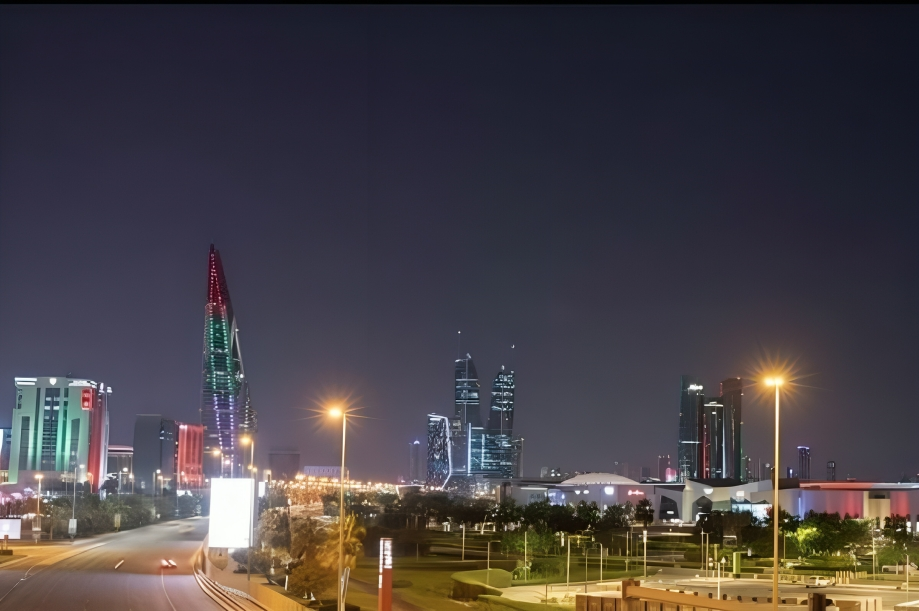Several Bahraini landmarks, key facilities and vital infrastructure have been adorned with the colours of the UAE national flag, coinciding with the celebrations marking the 53rd Eid Al Etihad (UAE National Day). The move reflects the strong historical ties between the two brotherly nations and their peoples.
His Royal Highness Prince Salman bin Hamad Al Khalifa, Crown Prince and Prime Minister, sent a cable of congratulations to the President of the United Arab Emirates (UAE), His Highness Sheikh Mohamed bin Zayed Al Nahyan, on the 53rd anniversary of the UAE’s National Day.
HRH Prince Salman sent a similar cable to the Vice President and Prime Minister of the UAE and Ruler of Dubai, His Highness Sheikh Mohammed bin Rashid Al Maktoum and the Vice President, Deputy Prime Minister, and Chairman of the Presidential Court of the UAE, His Highness Sheikh Mansour bin Zayed Al Nahyan.
Read more | UAE National Day: Celebrating 53rd Eid Al Etihad with nationwide festivities

Collaboration on industry initiatives
Building on the strong and historical ties between the Kingdom of Bahrain and the UAE, technical teams from both nations have recently convened to explore strategies for implementing a memorandum of understanding (MoU) signed in January 2024 by the Bahrain Ministry of Industry and Commerce and the UAE Ministry of Industry and Advanced Technology (MoIAT) and fostering synergies between the UAE’s National In-Country Value (ICV) Program and Bahrain’s Value Program in Industry (Takamul).
The two parties finalized the procedures to implement the MoU and agreed that Bahraini industrial enterprises would be eligible to apply for the National ICV Program and obtain the program’s certification according to the UAE’s procedures and standards, through the authorized entities issuing the certification. This would allow them to participate in federal government procurement tenders in the UAE.
Meanwhile, Emirati industrial enterprises will also be eligible to benefit from Bahrain’s Takamul Program by receiving a 10 percent preference if they complete the qualification process by applying through the Ministry of Industry and Commerce’s online portal.
Financial sector cooperation
In September 2024, Mohamed Hadi Al Hussaini, UAE minister of State for Financial Affairs, met with Abdulla bin Adel Fakhro, Bahrain’s minister of Industry and Commerce, to discuss joint cooperation in the financial sector and other areas of mutual interest between the two nations. The meeting, held at the ministry’s headquarters in Dubai, explored ways to leverage the UAE’s expertise in corporate credit rating and its role in fostering transparency, which encourages companies to expand and innovate, to boost Bahrain’s business ecosystem.
Growing bilateral trade
In 2022, non-oil bilateral trade between the two nations reached around $7 billion. The two countries have also witnessed greater cooperation in key sectors including trade, investment, education, culture, renewable energy, financial technology, tourism, and health.
Bahrain imports from the UAE was $1.44 billion during 2023, according to the United Nations COMTRADE database on international trade. In addition, Bahrain exports to the UAE stood at $1.77 billion during 2023.
High-level diplomatic engagement
In September, the UAE President His Highness Sheikh Mohamed bin Zayed Al Nahyan received Prince Salman bin Hamad Al Khalifa, Crown Prince and Prime Minister of the Kingdom of Bahrain. During their meeting in Washington lately, the two leaders exchanged talks on the fraternal relations between the UAE and Bahrain. They also discussed joint efforts to enhance cooperation for the benefit of the two brotherly peoples. The meeting saw the participation of Sheikh Abdullah bin Zayed Al Nahyan, deputy prime minister and minister of Foreign Affairs; Sheikh Hamdan bin Mohamed bin Zayed Al Nahyan, deputy chairman of the Presidential Court for Special Affairs, and Sheikh Mohammed bin Hamad bin Tahnoun Al Nahyan, advisor for Special Affairs at the Presidential Court. Also in attendance were Khaldoun Khalifa Al Mubarak, chairman of the Executive Affairs Authority; and Yousef Al Otaiba, ambassador of the UAE to the U.S.
Also in September 2024, His Highness Sheikh Mohammed bin Rashid Al Maktoum, Vice President, Prime Minister, and Ruler of Dubai, met with His Majesty King Hamad bin Isa Al Khalifa of Bahrain in Abu Dhabi. The meeting was held at the residence of the King of Bahrain in the capital city.
During their discussion, His Highness and His Majesty emphasized the robust and enduring ties between the UAE and Bahrain, reaffirming their dedication to further strengthening these connections to fulfill the aspirations of both nations and their citizens.
They also examined the significant advancements in cooperation across various sectors, highlighting the necessity of enhancing collaborative efforts to support the development objectives of both countries and promote greater prosperity and progress.

UAE’s FDI contribution
The UAE contributed 10 percent of Bahrain’s foreign direct investment (FDI) stocks, taking the third place, according to the latest figures. According to a statement from the Bahrain Economic Development Board (Bahrain EDB), Bahrain secured a record $6.8 billion in FDI inflows in 2023, as reported in the latest World Investment Report (WIR 2024) by the United Nations Conference of Trade and Development (UNCTAD). Remarkably, Bahrain’s FDI stocks relative to GDP stood at 99.7 percent as of the end of 2023, a figure significantly higher than the global average of 46.9 percent, marking one of the highest ratios in the world.
The 2023 FDI inflows marked a huge increase of 148 percent from the previous record of $2.8 billion in 2022, contributing to the growth of cumulative inward FDI stocks, which climbed from $36.2 billion in 2022 to $43.1 billion in 2023.
Furthermore, Bahrain’s nominal GDP increased from around $11 billion in 2003 to over $43 billion in 2023, marking an average annual growth of 7 percent, surpassing the global average of 5 percent. In addition to securing healthy economic growth, Bahrain’s economy also diversified, with the financial services sector overtaking the oil sector as the highest contributor to real GDP, standing at 17.8 percent in 2023, a significant milestone.








